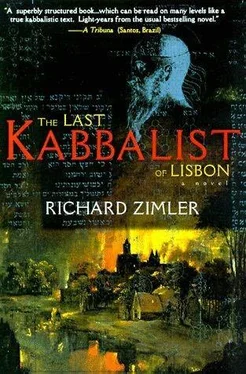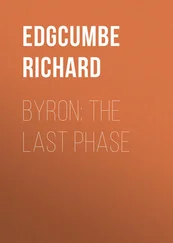Richard Zimler - The Last Kabbalist of Lisbon
Здесь есть возможность читать онлайн «Richard Zimler - The Last Kabbalist of Lisbon» весь текст электронной книги совершенно бесплатно (целиком полную версию без сокращений). В некоторых случаях можно слушать аудио, скачать через торрент в формате fb2 и присутствует краткое содержание. Год выпуска: 1998, Издательство: Arcadia Books, Жанр: roman, Исторический детектив, Философия, на английском языке. Описание произведения, (предисловие) а так же отзывы посетителей доступны на портале библиотеки ЛибКат.
- Название:The Last Kabbalist of Lisbon
- Автор:
- Издательство:Arcadia Books
- Жанр:
- Год:1998
- ISBN:нет данных
- Рейтинг книги:5 / 5. Голосов: 1
-
Избранное:Добавить в избранное
- Отзывы:
-
Ваша оценка:
- 100
- 1
- 2
- 3
- 4
- 5
The Last Kabbalist of Lisbon: краткое содержание, описание и аннотация
Предлагаем к чтению аннотацию, описание, краткое содержание или предисловие (зависит от того, что написал сам автор книги «The Last Kabbalist of Lisbon»). Если вы не нашли необходимую информацию о книге — напишите в комментариях, мы постараемся отыскать её.
The Last Kabbalist of Lisbon — читать онлайн бесплатно полную книгу (весь текст) целиком
Ниже представлен текст книги, разбитый по страницам. Система сохранения места последней прочитанной страницы, позволяет с удобством читать онлайн бесплатно книгу «The Last Kabbalist of Lisbon», без необходимости каждый раз заново искать на чём Вы остановились. Поставьте закладку, и сможете в любой момент перейти на страницу, на которой закончили чтение.
Интервал:
Закладка:
No accidents, no coincidences. Is it possible?
So far, I have only dared to tell Farid of my theories, and in reply he signalled, “But don’t you think Uncle could have done more for the Jewish people alive than dead?”
A good question. Events may have moved too quickly for my master to control them. And as I say he may have only understood his purpose in a flash of insight, just as Diego tossed a rosary around his neck.
I believe that he trusted that God could make better use of him dead than alive.
In any event, I have no answer except the faith which burns in my gut. But even if my theory is dreadfully wrong, I still dare not put my pen down or tear up these pages. I cannot bet the survival of the Jews on the righteousness of European Kings who have shown time and again that they bear no sense of justice. Because even if I’m wrong, even if I am reading from left to right, even if my master was so exhausted from his vigil for Reza that he could not lift his hands to fight Diego, can you be sure that the Christians won’t one day come for you, for all of us? That traitors like Diego won’t help them?
And so, we finally come to Diego and to what the true meaning of his betrayal might be. This I have asked myself many times, of course.
The key to my interpretation of his actions resides in the kabbalistic definition of evil— good which has departed from its rightful place.
I believe that Diego was a man who could have flourished amongst his own people. In living with Old Christians, however, in having to struggle against the terror which their Church and Inquisition inspired in him, he turned to evil.
And so I believe that there will be many others like Diego who will conspire against us unless we move from Europe. That, too, is part of the meaning of Uncle’s death.
As for my hesitation to speak of this… Not surprisingly, part of me would like to dismiss my words as rubbish. For if my faith points toward the truth, then I have failed my uncle miserably. Twenty-three years ago, I allowed my cousin, Reza, to remain behind in Portugal. May Uncle forgive me. For if he is right, if my reading of the verses of the past is correct, then her family is doomed.
That is why I must take the blessed keys dear Lourenço has given me and re-enter Portugal’s gates. This manuscript is the weapon which I will carry with me. May its words string together to form the noose that will hang Haman.
Farid says he will accompany me, that I will need his protection. Perhaps he is right. Together, we will fetch Reza and her family and bring them back to Constantinople.
May all the New Christians and Jews accompany us.
And may my children and wife understand my reasons for leaving.
The first thin light of dawn has just pierced my window shutters, and my wrist aches. It is time for me to reach into my ink well for the last few strokes of my pen. Let the angels behind my words press understanding into my soul and yours.
As I said at the very beginning, this is a story of warning. You who read these words, whether Jew or New Christian, Sephardi or Ashkenazi, if the borders of Europe still enclose you, then you are in grave danger. The Inquisition will spread, and very soon our Bleeding Mirror will run with blood as it never has before. That is why Uncle appeared to me now. The killing is only just beginning. You can be assured, the European kings and their hateful bishops will never stop dreaming of us. They will never allow you and your children to live. Never! Sooner or later, in this century or five centuries hence, they will come for you or your descendents. No village, no matter how remote, will be safe. No aristocrat or foreign army will come to protect you. This is the meaning I make of Uncle’s death. So take off your mask. Face Constantinople and Jerusalem. And start walking.
Cast out Christian Europe from your heart and never look back!
Blessed are all of God’s self-portraits.
Berekiah Zarco, Constantinople
The Seventh of Av, 5290
Glossary
AdarThe sixth month of the Hebrew lunar calendar, generally coinciding with part of February and part of March.
AnusimHebrew word for Jews forced to convert to Christianity.
AsmodeusThe king of the Jewish demons.
AvThe eleventh month of the Hebrew lunar calendar, generally coinciding with part of July and part of August.
Ba’al ShemIn kabbalistic texts, a title applied to mystics who possess secret knowledge of the holy names of God and who can make magical use of such knowledge.
BahirThe Book of Light. An influential kabbalistic text discovered in Provence in the 12th century.
ChallahA Jewish egg bread.
ChametzFood which Jews are forbidden to eat during Passover, especially leavened bread.
ChazanThe leader of prayers and chief singer of the liturgy in a synagogue.
Ein SofThe hidden God which cannot be perceived, described or in any way approached. The existence and nature of such a God can only be deduced from its emanations or attributes in our world.
ElohimOne of the names of God.
GenizahA depository for sacred books.
GolemA creature, usually in human form, created by magical means through the use of holy names, particularly the Tetragrammaton.
HaggadahThe text containing both the story of the Exodus and the ritual of the ceremonial meal which is eaten in celebration of Passover. Jewish manuscript illuminators from Iberia and other parts of Europe frequently illustrated Haggadahs with Biblical scenes.
HalizahBiblically prescribed ceremony performed when a man refuses to marry his brother’s childless widow.
HamanA Persian courtier who plotted to massacre the Jews (from the Book of Esther).
HanukkahA Jewish festival held in the winter which celebrates the victory of the Maccabees, a Jewish tribe, over the Syrians in 165 B.C.
HeshvanThe second month of the Hebrew lunar calendar, generally coinciding with part of October and part of November.
HarosetA mixture of chopped fruits, nuts and spices eaten on Passover and representing the mortar used by Hebrew slaves in building for the Egyptian Pharaoh.
IbburAn evil spirit or wandering soul of a deceased person that enters the body of a living person and controls his or her behavior.
KaddishThe prayer for the dead which is recited by mourners.
KislevThe third month of the Hebrew calendar, generally coinciding with part of November and part of December.
KosherFit for human consumption, according to Jewish dietary laws.
LezA mischievous Jewish demon or poltergeist.
LeviteA person belonging to the religious caste of priests descended from Levi, son of Jacob.
LilithIn Jewish legends, a female demon who strangles children and seduces men. She is sometimes regarded as the queen of all that is evil.
Magen DavidA six-pointed star used as a symbol of Judaism.
MaimonA powerful Jewish demon.
MatzahUnleavened bread baked by the Israelites during the Exodus from Egypt and eaten during the holiday of Passover. The only ingredients are flour and water.
MenorahA candelabrum generally having seven or nine branches which is lit during the fesitval of Hanukkah.
MetatronThe heavenly angel who records good deeds.
MezuzahA small case containing a piece of parchment upon which is written the particular Jewish prayer which begins “Hear O Israel.” This case is affixed to the doorpost of a Jew’s home and was sometimes regarded as offering protection against the attacks of demons.
Читать дальшеИнтервал:
Закладка:
Похожие книги на «The Last Kabbalist of Lisbon»
Представляем Вашему вниманию похожие книги на «The Last Kabbalist of Lisbon» списком для выбора. Мы отобрали схожую по названию и смыслу литературу в надежде предоставить читателям больше вариантов отыскать новые, интересные, ещё непрочитанные произведения.
Обсуждение, отзывы о книге «The Last Kabbalist of Lisbon» и просто собственные мнения читателей. Оставьте ваши комментарии, напишите, что Вы думаете о произведении, его смысле или главных героях. Укажите что конкретно понравилось, а что нет, и почему Вы так считаете.












